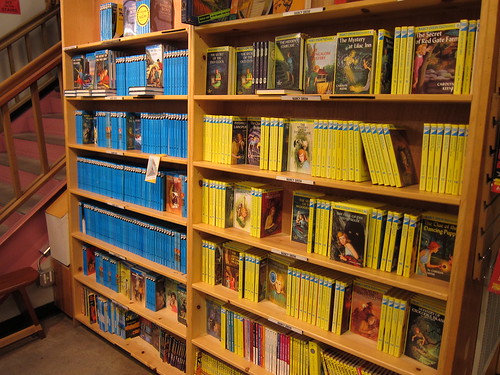No matter how you might feel about the books, you know you wouldn't mind writing something with Twilight-like popularity. You wouldn't mind having a popular series like The Hunger Games, probably, just like most authors. Writing a series is great. It allows you spend some time in a certain world, gives you the chance to really develop your characters and could even become a hugely successful movie franchise. But writing a series can also turn into a trap. This is the good side and the really ugly side of a neverending series of books.
This is the Series That Doesn't End
Sometimes, a book series can become much bigger than the author ever expected. The character in the series, the series itself, becomes much bigger than the author. Like, way bigger. Some book series don't end. Like, ever.
This is the Series That Doesn't End
Sometimes, a book series can become much bigger than the author ever expected. The character in the series, the series itself, becomes much bigger than the author. Like, way bigger. Some book series don't end. Like, ever.
Don't believe me? Try getting into the "Deathlands." That series has 135 books in it -- at last count, anyway. The "Fortune's Children" series, a family saga, has at least 69 books in it and it's only been around since 1996.
Ever read "The Baby Sitter's Club?" I did, but I know I didn't read all 207 books in the series. Can you begin to imagine writing about the same characters for 207 books? I'm not sure I could even do it for 7 books.
But even that is nothing compared to the combined powers of "The Hardy Boys" and "Nancy Drew." Together, their stories encompass a mind-blowing 616 books. They're written by all different authors, of course. Most people have no idea who the original author of "Nancy Drew" was...and don't care.
Some book series become bigger than a single author and literally span generations. An author who starts such a series has a certain amount of job security -- okay, a lot of job security -- and has the opportunity to build a strong fan base. That's great.
But an author writing such a series may soon feel trapped by that series. Within a series, you pretty much have to follow a certain structure and focus on certain characters. After all, what's a Nancy Drew book without Nancy Drew? Writing about the same stuff over and over again gets stifling, particularly for authors who write in different genres. And then one day, the original author of the series is no longer writing those books so someone else takes over. They take your creation, and they begin to write it. That's what happens with book series that don't end, like Nancy Drew.
For some authors, that's a bonus. That's a legacy that's left behind, and still growing. But for other authors, that's a bit insulting. The neverending series has a good side and a bad side. Examine both before you attempt to write one.











0 comments:
Post a Comment